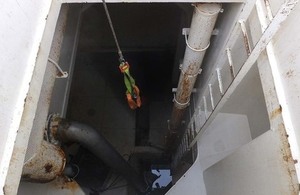BepiColombo is the first European Space Agency mission to Mercury, the least explored planet in the inner Solar System, and will provide new insight into how the planet closest to the Sun formed and evolved.
The spacecraft will travel 9 billion km taking 7 years to reach Mercury and is designed to survive extreme temperatures, from +450 to -180 degrees.
BepiColombo: mission to Mercury
Science Minister Sam Gyimah said:
As this mission to Mercury sails under the stars we can reflect on the features of UK science that have made it possible. It is a sign of how far our space industry has come in exploring how much further humanity can go.
Much of the spacecraft was built right here in the UK by our growing space sector, employing nearly 40,000 people right across the country. Our modern Industrial Strategy is building an environment in which it will continue to thrive.
The mission is an outstanding example of international collaboration at the highest level between the European and Japanese space agencies. The UK’s involvement is managed and funded by the UK Space Agency.
The UK’s founding membership of ESA has given the UK a key role in this mission which will provide a unique science return and maintain the UK’s position at the forefront of space exploration by investing in the technology. Every £1 invested in ESA results in a £1 share in contracts for UK companies and universities.
Dr Graham Turnock, Chief Executive of the UK Space Agency, said:
UK scientists, engineers and technicians have played a vital role in developing BepiColombo and the incredibly sophisticated set of scientific instruments on board. The international collaboration involved in this mission shows how our leading role in the European Space Agency is ensuring the UK thrives in the new space age, bringing real benefits to UK companies and scientists.
The UK’s contribution to the mission:
- The UK Space Agency funded, and University of Leicester designed and built the Mercury Imaging X-ray Spectrometer (MIXS). This instrument will use novel X-ray optics to determine small-scale features on Mercury and find out what the planet’s surface is made of.
- Airbus Defence and Space provided spacecraft structures, electrical and chemical propulsion systems and the systems which will separate the spacecraft modules on arrival at Mercury.
- QinetiQ supplied the innovative electric propulsion system. A beam of charged particles are expelled from the spacecraft to propel it forward. Ion propulsion produces low levels of thrust very efficiently compared with conventional chemical rockets.
- Thales Alenia Space UK supplied the Remote Interface Units that acquire sensor data and telemetry as well as driving the thrusters that control the spacecraft.
- UK teams also provided a hardware contribution to the Finnish led Solar Intensity X-ray & particle spectrometer (SIXS).
Emma Bunce, Professor of Planetary Plasma Physics at the University of Leicester said:
The University of Leicester technical and engineering team has dedicated many years of work to design, develop and build the Mercury Imaging X-ray Spectrometer (MIXS) instrument, in collaboration with multiple institutes and companies across Europe.
MIXS is designed to measure fluorescent X-ray photons from the surface of Mercury which will give us details of the elemental composition, and hence provide insight on the formation and evolution of the planet. MIXS will also explore how the charged particle environment interacts with the surface. The dual system of MIXS will allow a good global coverage of the planet using the efficient collimator (MIXS-C) design and will provide unprecedented detail of local-scale features using the first true imaging telescope (MIXS-T) for a planetary mission.
Peter Randall, Electric Propulsion Systems Engineer, QinetiQ, said:
QinetiQ has more than 50 years’ experience of developing and testing electric propulsion systems and so we are delighted that our super-efficient T6 ion engines will play such a pivotal role in the seven year voyage to Mercury.
The new T6 ion thrusters have been designed to work for long periods in extremely hostile environments and, powered by solar energy, will enable the spacecraft to reach maximum speed with minimal fuel consumption. The ground-breaking development of these thrusters couldn’t have resulted in a more thrilling project and we are proud to be the engine power behind the BepiColombo mission to Mercury.
Justin Byrne, Head of Earth Observation, Navigation and Science, Airbus UK said:
Building a spacecraft that needs to travel billions of km is quite a challenge – but we made it work with the comet chaser Rosetta, and BepiColombo is a worthy successor. All the Airbus teams in Stevenage and Portsmouth will join with their colleagues across the rest of Europe in making sure the launch goes according to plan
Key science objectives are to discover:
- The origin and evolution of a planet close to its parent star
- The planet’s interior structure and composition
- Characteristics and origin of its internal magnetic field
- Surface processes, such as cratering, tectonics, polar deposits and volcanism
- The structure, composition, origin and dynamics of Mercury’s exosphere
- The structure and dynamics of Mercury’s magnetosphere
- Einstein’s Theory of General Relativity (by making precise measurements of the spacecraft’s orbit and position)
David Rothery, Professor of Planetary Geosciences at the Open University, said:
We really need to understand Mercury better. So much about it seems wrong for a planet that close to the Sun, so maybe it originated further out. A collision with the proto-Earth or proto-Venus could be what robbed it of so much of its original rock.
As a volcanologist though, one aspect that really impresses me about Mercury is all the volcanic explosion vents. They are spectacular evidence of violent eruptions, powered by escaping gas that recurred for much of the past four billion years.
The UK’s space sector is going from strength to strength, employing around 40,000 people and carrying our world-class science while growing the economy. In 2016 the UK committed €1.4 billion across a range of ESA space programmes, leading European space research in telecommunications and Earth Observation, while providing cutting-edge capabilities in exploration.
This is all supported by the Government’s Industrial Strategy, with major initiatives such as the National Satellite Test Facility at Harwell and the development of a commercial spaceport in Sutherland, Scotland, which could be the first in mainland Europe.
BepiColombo will launch from Europe’s spaceport in French Guiana at 02:45 UK time on Saturday (20th October). The spacecraft is named after Giuseppe (Bepi) Colombo (1920-84), an Italian mathematician and engineer, who studied Mercury’s orbital motion.


